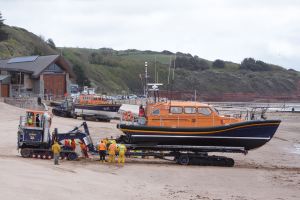The RNLI have spent two days in Exmouth (Wednesday 18 and Thursday 19 April) carrying out trials of a new class of lifeboat. The Shannon class all-weather is at present undergoing extensive sea and beach trials around the country where she’s been tested out in a range of conditions.
The new lifeboat has been designed in-house by RNLI naval architects who have harnessed cutting-edge technology to ensure it meets the demands of a modern day rescue service. The Shannon features twin water jets instead of conventional propellers, allowing her to operate in shallow waters and to be highly manoeuvrable. At present a team of RNLI personnel are busy testing her abilities and the new system that’s been designed to launch and recover the lifeboat.
John Deas is the RNLI’s Principal Engineer Launch and Recovery:
‘The Shannon represents a lot of firsts for the RNLI; she’s the first lifeboat to run on water jets instead of propellers and she’ll be the first to use the new launching system that has been designed specifically with her in mind. All this needs stringent and comprehensive testing and that’s why we are carrying out extensive trials all around the country.
‘We’re delighted with the Shannon’s performance and while at Exmouth have been able to work her in shallow water. We’ve also been able to carry out extensive trials on the new RNLI Launch and Recovery System that’s been developed jointly between the RNLI and Supacat, specifically for this lifeboat. The system enables the lifeboat to be launched and recovered from beaches, which in a lot of cases are some distance from the boathouse. The space on the beach outside the Exmouth RNLI lifeboat station has proved really useful for trialling the new system and lifeboat.’
Like all RNLI all-weather lifeboats, the Shannon is self-righting and will return to the upright position in the event of a capsize during extreme weather or sea conditions. The lifeboat also incorporates SIMS (System and Information Management System) which allows the crew volunteers to monitor the lifeboat from the safety of their seats, reducing the need to move around and risk injury.
The £1.5 million lifeboat will continue to undergo sea trials this year, with the first operational Shannon class lifeboat going on station in 2013. One of the first lifeboat stations in the south west to receive a Shannon will be St Ives in Cornwall.

